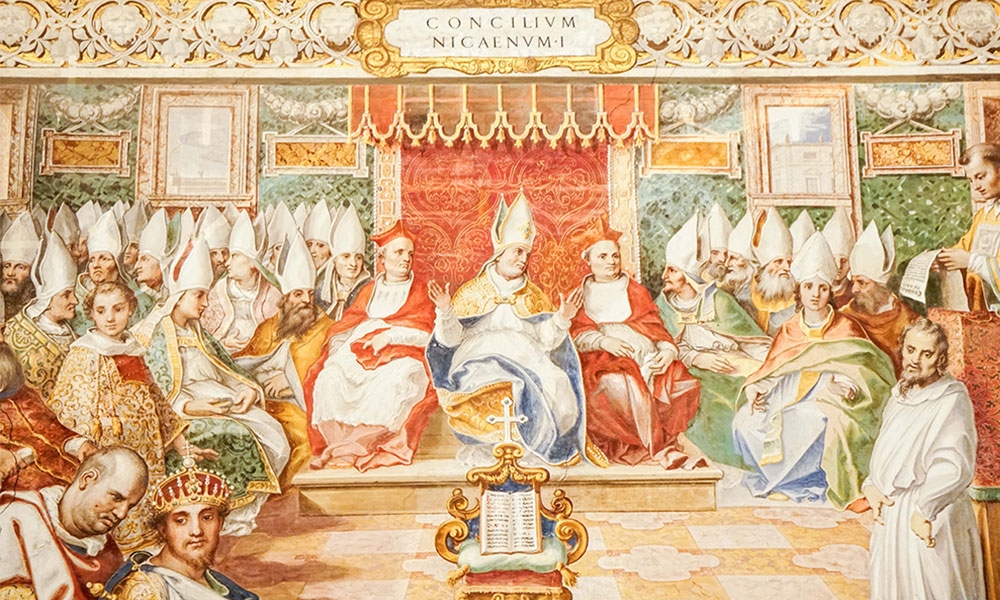
The Council of Nicaea shaped Christianity forever
Seventeen centuries ago this year, Roman Emperor Constantine made history by convening Christianity’s first ecumenical council — a moment that would forever shape our faith. In the summer of 325 AD, the ancient city of Nicaea (modern-day Iznik, Turkey) witnessed an unprecedented gathering.
Seventeen centuries ago this year, Roman Emperor Constantine made history by convening Christianity’s first ecumenical council — a moment that would forever shape our faith. In the summer of 325 AD, the ancient city of Nicaea (modern-day Iznik, Turkey) witnessed an unprecedented gathering.
Nearly 300 bishops journeyed from across the Roman Empire — each accompanied by two priests and three deacons — to engage in profound deliberations from May to August that year. They would establish theological foundations on which we stand today. This remarkable assembly sought to forge unity and doctrinal clarity at a crucial crossroads for the emerging Christian Church.
Although he presided over the opening session and took part in many of the sessions, Constantine was not yet baptized when he convened the council. It was the emperor’s eventual conversion that resulted in Christianity’s move from persecuted to preferred religion of the Roman Empire.
Pope Sylvester I, who reigned during the First Council of Nicaea, was not able to attend personally. He sent Bishop Hosius of Corduba (now Córdoba, Spain), who was a champion for and advocate that Jesus Christ and the Holy Spirit are “of the same essence” as God the Father. Hosius was accompanied by papal legates Vitus and Vincentius.
The primary intention of Constantine and the council was to settle the heresy of Arianism — brought about byArius of Alexandria — which purported that Christ was not co-eternal with God, but instead was a created being. This controversy threatened the stability of the empire.
The council’s goal was also to establish a unified statement of faith, now known as the Nicene Creed. It says that Jesus Christ is “the Only Begotten Son of God, born of the Father before all ages. God from God, Light from Light, true God from true God, begotten, not made, consubstantial with the Father …”
The Nicene Creed has since been accepted by Roman Catholics, Eastern Orthodox, Anglican and some Protestant denominations as core beliefs about God the Father, Jesus and the Holy Spirit. Emphasis is given that the world was created by God the Father and the Incarnation, crucifixion, resurrection and ascension of Jesus Christ were necessary for the salvation of humanity.
The Nicene Creed is typically recited during Mass on Sundays and feast days, particularly Christmas, Easter, Ascension and Pentecost, though both the Nicene Creed and Apostles’ Creed are acceptable. The Apostles’ Creed is often used during Lent and Easter because of its connection to our renewed baptismal promises.
Father Brendan Lupton, STD, is associate professor of dogmatic theology and president of the pontifical faculty of theology at the University of St. Mary of the Lake/Mundelein Seminary in the Archdiocese of Chicago. He said the Nicene Creed “contains the essence of Christianity, Christ is homoousios with the Father, i.e., is one in being with the Father, since he is divine.
“This is the main Christian claim that was revolutionary in the Ancient World. For the pagans, if one wanted to encounter a ‘god,’ one had to appease the god through sacrifice or libation. Christianity flipped the script, and God came to human beings. Although it seems like a truism today, it was radical in the Ancient World and summarizes the essence of the Christian faith,” he said.
As the Council of Nicaea marks its 17th centenary, let’s remember it as a testament to how a single gathering can reshape the trajectory of human faith. The doctrinal clarity established at Nicaea transcended barriers and provided theological foundations that have guided countless generations of believers across denominations.
Perhaps most remarkably, this council demonstrates how challenging theological questions, when addressed with wisdom and spiritual discernment, can forge unity rather than division. The Nicene Creed’s continued recitation worldwide serves as a living bridge from modern Christians to those early Church Fathers who journeyed to a small city in Turkey to define what would become the cornerstone of Christian belief.
We still hear the echoes of that pivotal summer of 325 AD when the essential nature of Christ was articulated in a declaration of faith that illuminates the Christian journey. It reminds us that at the heart of our diverse expressions of Christianity lies a shared understanding of who Christ is and what that means for humanity’s relationship with the Divine.
Ron Kuzlik is a regular contributor to various Catholic publications. He is a Fourth Degree Knight of Columbus and former U.S. Navy and Navy Reserve public affairs professional. Email him at smrguy05@yahoo.com.



